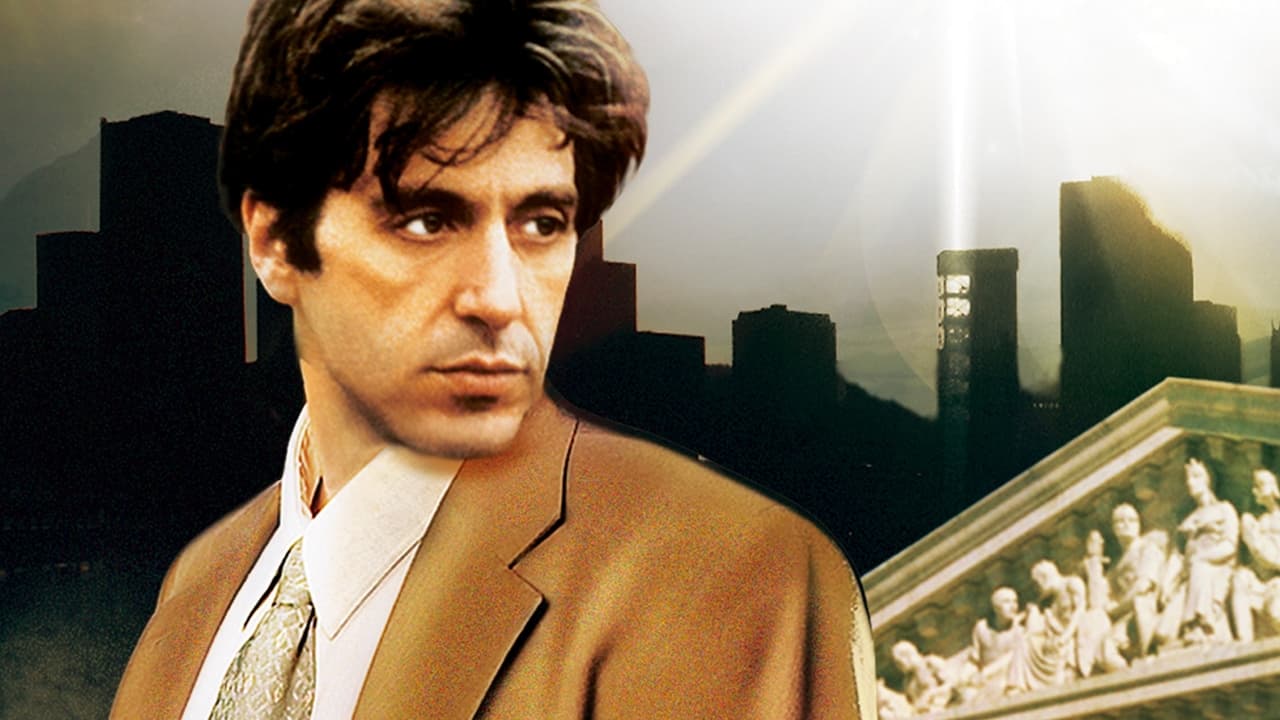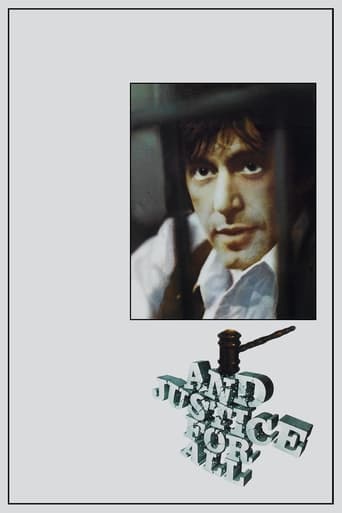

I can't believe a director of Norman Jewison's caliber would make a movie this bad. The acting is terrible and the script is ridiculously over the top. The movie is more uninspired slapstick than courtroom drama. Name me a single incident in history where a judge fired his revolver at the ceiling instead of using his gavel to silence his courtroom?
... View MoreUnlike most other Al Pacino "...and justice for all" seems to have been mostly forgotten in the decades that have passed since it was in theaters. Watching it, I think I know the main reason why it hasn't managed to stay in the consciousness of the general public. The most plausible reason is that the movie doesn't seem to know what tone to follow. Certainly, it's okay for a black comedy to have occasional touches of seriousness. It's also okay for a serious drama to have occasional touches of humor, dark or otherwise. But with this movie, the filmmakers seem to be trying hard to give both seriousness and humor an equal footing. As a result, the movie presents a very weird world where people alternately drift from one extreme to another and then back again. It's often kind of hard to relate to.But while the movie is kind of schizophrenic in tone, it does have some strengths that probably make it worth a look. The strange tone does get you to a degree curious to see what unusual move the movie will make next. There are individual vignettes that do deliver some power, and will stick with you long after the movie is over. Pacino delivers another solid performance; in fact, all the performances in the movie are good. And along the way, the movie does manage to make some biting commentary on the justice system that is still relevant today, showing that justice is NOT for all participants in the system. If you are willing to put up with a very uneven tone, the movie will probably keep you interested and entertained for two hours. As I said, it's certainly never dull.
... View More"And Justice For All" is an entertaining yet meaningful movie in that it exposes the many flaws in our system of jurisprudence. It does so by taking a satirical look at the system through a variety of characters in the film. When Judge Henry T. Fleming is accused of rape, he hires defense attorney Arthur Kirkland (Al Pacino) to represent him. Kirkland is a fiery, idealistic lawyer who cares for people- and who detests Fleming, a man with whom he's battled in the courtroom and regards as both uncaring and arrogant. Furthermore, Fleming is holding up the release of a Kirkland client falsely accused of murder. This is of no consequence to Fleming, who instead sees an opportunity to make his innocence more apparent by having an adversary defend him. Kirkland wants no part of this charade, until Fleming threatens to blackmail him with long buried information on a breach of attorney-client privilege. Reluctantly, Kirkland takes the case.Several events rattle Kirkland as he prepares his defense; a near-fatal helicopter ride with a presumably suicidal judge (Jack Warden) and the public nervous breakdown of his law partner (Jeffrey Tambor). Things turn tragic when two of Kirkland's clients die in separate incidents. A harmless, transgender man hangs himself when he is mistakenly sent back to jail in Kirkland's absence, and McCullough- the man Fleming prevented from being released- is shot in a hostage situation, as Kirkland attempts to diffuse it. Enraged and disillusioned at such an unthinkable turn of events, Kirkland sits on a bench outside the courtroom and ponders his role in a system he perceives as terribly indifferent and cruel.Shortly thereafter, Kirkland receives photos from another client that show Judge Fleming engaged in S&M acts with a prostitute. When shown the pictures, Fleming smirks and admits his guilt in the rape for which he is accused. A disgusted Kirkland leaves the room as a haughty Fleming reminds him that "he'll see him in court". The trial begins, and after the prosecution's opening statement, it is Kirkland's turn. After what appears to be a legitimate attempt to discredit the prosecution for their "lack of a case", he stuns everyone by declaring Fleming's guilt and proclaims "he should go right to f*ckin' jail". As the judge objects and the crowd erupts into chaos amidst this blatant breach of etiquette, Kirkland is dragged from the courtroom. He screams at Fleming- who looks on with a mixture of both disbelief and disgust- for disgracing the law and the people he represents.Pacino is outstanding. His courtroom scene is one of those moments in film that is stamped indelibly on one's memory. He perfectly conveys the disenchantment of a man hopelessly swimming against the tide despite his best efforts. In the end he all but sacrifices a career to ensure that a thoroughly detestable man, a person who is "supposed to protect people" is ruined professionally. Fine character work is turned in by both John Forsythe as Fleming and Jack Warden as an eccentric judge who keeps a rifle in his chambers and eats his lunch on the ledge of a 4th floor balcony.A highly recommended movie and a must for Pacino fans.
... View MoreAn ethical Baltimore defense lawyer (Al Pacino) disgusted with rampant legal corruption is asked to defend a judge he despises (John Forsythe) in a rape trial. But if he does not do it, the judge will have him disbarred.Roger Ebert says of this film that "it's not a statement, it's an anthology." And that is absolutely right. The plot above, and a similar plot on the back of the movie's case, only cover about one quarter of what goes on in this film. We have a crazy attorney, a prison riot, a suicidal judge (played expertly by Jack Warden)... the rape trial actually turns out to be such a small part.But that is a good thing, because we get to see Al Pacino being a little bit excited in a variety of different circumstances. And the tone is incredible -- some parts are deadly serious (rape, murder and suicide have to be to some degree) while much of the movie is a very, very dark comedy. And it is incredible.
... View More